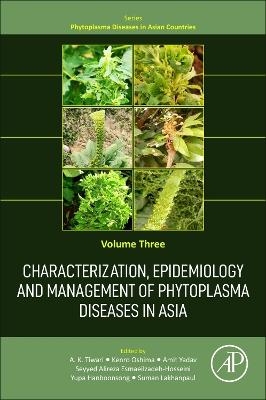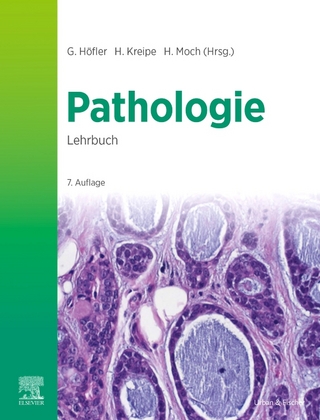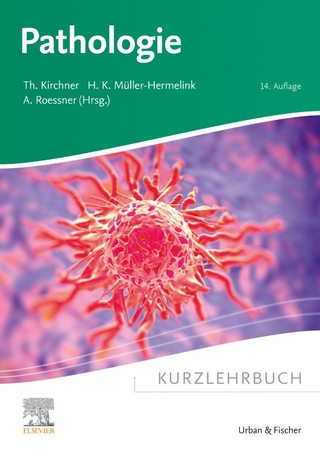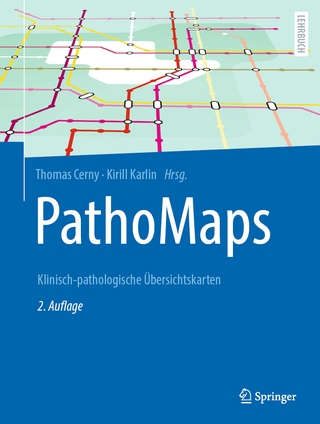
Characterization, Epidemiology, and Management
Academic Press Inc (Verlag)
978-0-323-91671-4 (ISBN)
Phytoplasma are microorganisms that are transmitted by insect vectors, infecting various different types of annuals and perennials and causing serious damage to crops across Asia.
Ajay Kumar Tiwari, PhD is a Scienti?c Of?cer and currently serving as Officer-In-Charge at Sugarcane Research and Seed Multiplication Center, Gola, Khiri, UP, India. He completed his Ph.D. on cucurbit viruses at the CCS University, Meerut, UP, India, in 2011. He is a member of the British Society of Plant Pathology, Indian Phytopathological Society, Sugarcane Technologists Association of India, International Society of Sugarcane Technologists, Society of Sugarcane Research and Promotion, Prof H. S. Srivastava Foundation, and Plant Research and Educational Promotion Society. He has published 100 research articles in reputed national and international journals. He has also authored eight books published by Springer, Taylor & Francis, and Nova. He has submitted more than 300 plant pathogen nucleotide sequences to GenBank. Dr. Tiwari is a regular reviewer and member of the editorial boards of several international journals and is managing editor of Sugar Tech published by Springer (IF1.591) and Chief editor of the Agrica journal. He received the CIPAM Young Researcher Award in 2011 and the DST-SERB Young Scientist Award. He was received the Young Scientist Award by the Chief Minister of the State Government of UP for his outstanding contributions in the area of plant pathology and was the recipient of many international travel awards conferred by DST, DBT, and CSIR in India; PATHOLUX-Luxembourg; and IOM-Brazil. He has attended conferences and workshops in China, Italy, Germany, Vietnam, and Thailand and has delivered invited talks in India and abroad. He is currently involved in research on the molecular characterization and management of agricultural plant pathogens and the production of healthy sugarcane seed materials and their distributions in UP through cane societies. Dr. Kenro Oshima is Plant Pathology professor at the Hosei University, Japan. He has 20 years of research experience on plant pathology especially on the genomes and pathogenicity of phytoplasmas. He has more than 60 peer reviewed international publications and has delivered numerous oral and posters presentations in national and international meetings. He and his group determined the first complete genome sequence of phytoplasma and found that the phytoplasma has lost many genes of metabolic pathway in the process of evolution. They also discovered the virulence factors of phytoplasmas such as TENGU and PHYL1 and clarified its mechanism of action. He is a member of the International Phytoplasma Working Group (IPWG) andhas participated in the revision of the ‘Candidatus Phytoplasma’species description guidelines in 2022. He is an Associate Editor of Frontiers in Microbiology for the section of Evolutionary and Genomic Microbiology. He was awarded as Kitamoto Award from Japanese Society of Mycoplasmology in 2018 and the Society Award from Phytopathological Society of Japan in 2021. Amit Yadav, Ph. D. is a Scientist at National Centre for Cell Science at Pune, India. He carried out his doctoral studies on ‘Sugarcane Grassy Shoot’ (SCGS) phytoplasma from University of Pune, Pune. Currently, his research group is involved in perusing research on ‘Candidatus phytoplasma’ involving the functional genomics, epidemiology, detection and diagnosis, plant-insect-phytoplasma interactions, and taxonomy. ‘Candidatus Phytoplasma’ is a ‘not-yet-cultured’ plant pathogenic bacteria involved in devastating diseases in economically important plants across the globe. Dr Yadav is currently working on epidemiology of Sandalwood Spike Disease related to ‘Ca. P. asteris’ and genome characterisation of Peanut Witches’ Broom (PWB) phytoplasma associated with Glycine max and Parthenium hysteroporous. He has published 58 peer-reviewed research articles which includes the reports on phytoplasma diseases on different plant species, phytoplasma genome sequencing and genome characterizations. He is review editor of specialty section in Frontiers in Microbiology: Microbe and Virus Interactions with Plants and Evolutionary and Genomic Microbiology (specialty section of ‘Frontiers in Microbiology’, ‘Frontiers in Genetics’ and ‘Frontiers in Ecology and Evolution). Also, he is editorial member of ‘Phytopathogenic Mollicutes’, a journal dedicated to phytoplasma studies. Dr Yadav is a member of Bergey's International Society for Microbial Systematics (BISMiS), Association of Microbiologists of India (AMI), Indian Association of Mycoplasmologists (IAM), International Organization of Mycoplasmology (IOM) and a member of board of studies in Botany at Sir Parashurambhau College, Pune. Seyyed Alireza Esmaeilzadeh-Hosseini, PhD. started working as a researcher in the Plant Protection Research Dept., Yazd Agricultural and Natural Resources Research and Education Center, AREEO, Yazd, Iran since 2000. Currently, he is a member of the academic staff and the head of the center. He has also taught plant virology and phytopathogenic prokaryotes courses in the universities of Yazd province. Dr. Esmaeilzadeh-Hosseini is reviewer of several international and national journals. He has participated in more than 52 research projects in the field of plant pathology, especially phytoplasma diseases. He has participated in the publication of more than 61 research articles in reputed national and international journals and also contribution to 76 paper presentation in national and international scientific congresses. Dr. Esmaeilzadeh-Hosseini has won the top position among the researchers of the universities of Yazd province and the researchers of the Iranian Research Institute of Plant Protection (IRIPP) several times. He is a member of the International Phytoplasma Working Group (IPWG) and has participated and presented papers in the 2nd to 4th IPWG Congress. He has introduced some new subgroups of phytoplasmas (16SrXXIX-B, 16SrIX-I and 16SrII-Z) and new hosts of these diseases in the world. He is currently involved in research on the biological and molecular characteristics of phytoplasmas and the management of these diseases in Iran. Yupa Hanboonsong, Professor in Entomology of the Department of Entomology and Plant Pathology, KhonKaen University. Thailand. She obtained a Ph. D in Entomology from Lincoln University, New Zealand. Prof. Hanboonsong and her research group is a pioneer on sugarcane white leaf disease caused by phytoplasma. Her research group contributed essential new knowledge and a better understanding about this sugarcane phytoplasma disease and its epidemiology including identification of new disease vectors, mode of transmission of the pathogen, the description of probing activities pattern of the vector and working out various measures for integrated management of the disease. Her research findings on sugarcane white leaf management expanded to other Asian countries for insect vectors and sugarcane white leaf disease control. Last year (2021) she has published a manual on new norm of seed cane propagation for sugarcane white leaf management and her new method of seed cane production for reducing sugarcane white disease is well known and practiced by sugarcane farmers in Thailand. Dr. Hanboonsong is also a member of the scientific board committee on sugarcane white disease management in Thailand under the office of cane and sugar board of the Ministry of Industry, Thailand. She is also member of the editorial board for the International Journal Sugar Tech. Suman Lakhanpaul is Senior Professor and presently Head, Department of Botany, University of Delhi, Delhi, India. She did her doctoral work from Delhi University in 1989 on Genome organization and Evolution in Asiatic Vigna and post- doctorate at Cornell University. She served ICAR-National Bureau of Plant Genetic Resources, New Delhi, India during 1987-2002 prior to joining Delhi University. She has worked on molecular basis of genetic diversity using modern approaches with a special focus on crops and their allied taxa. In addition, she is passionate about studying mechanisms underlying multi-partner trans-kingdom interactions in nature such as host plant-lac insect-microbe and phytoplasma-host taxa-insect vector interactions. She has over 100 publications in journals of reputed national and international journals and books. She is a regular reviewer of several scientific journals. She has guided 13 Ph.D. and 9M.Phil students and has been actively teaching Masters students for three decades. She has handled several research projects from prestigious funding agencies including world Bank. Professor Lakhanpaul has widely travelled and has been a visiting scientist to USDA research institutes and delivered lectures in international conferences in Australia, Austria, USA etc. Currently, her research interest is Phytoplasma Biology that included identifying new hosts of Phytoplasma and unraveling the mechanism underlying Phytoplasma associated developmental alterations in host taxa using genomic approaches.
1. Novel methods of phytoplasma detection in Asian Countries
2. Graft transmitted phytoplasma diseases in Asia and their management
3. Transmission of lime witches’ broom disease
4. Major Insect vectors of phytoplasma disease in Asian Countries
5. Genomic studies of Asian phytoplasmas
6. Cross boundary movement of phytoplasma in Asia and status quarantines
7. Management of phytoplasma diseases in Asian countries
8. Management of insect vectors of phytoplasma diseases
9. Elimination of phytoplasmas: an effective control prospective
10. Plant resistance to phytoplasma associated diseases
11. microRNAs in plant development and their role in Phytoplasma associated developmental alterations
12. Characteristic features of genome and pathogenic factors of phytoplasma
| Erscheinungsdatum | 17.04.2023 |
|---|---|
| Reihe/Serie | Phytoplasma Diseases in Asian Countries |
| Zusatzinfo | 70 illustrations (40 in full color); Illustrations |
| Verlagsort | Oxford |
| Sprache | englisch |
| Maße | 191 x 235 mm |
| Gewicht | 480 g |
| Themenwelt | Studium ► 2. Studienabschnitt (Klinik) ► Pathologie |
| Naturwissenschaften ► Biologie ► Botanik | |
| ISBN-10 | 0-323-91671-6 / 0323916716 |
| ISBN-13 | 978-0-323-91671-4 / 9780323916714 |
| Zustand | Neuware |
| Informationen gemäß Produktsicherheitsverordnung (GPSR) | |
| Haben Sie eine Frage zum Produkt? |
aus dem Bereich


